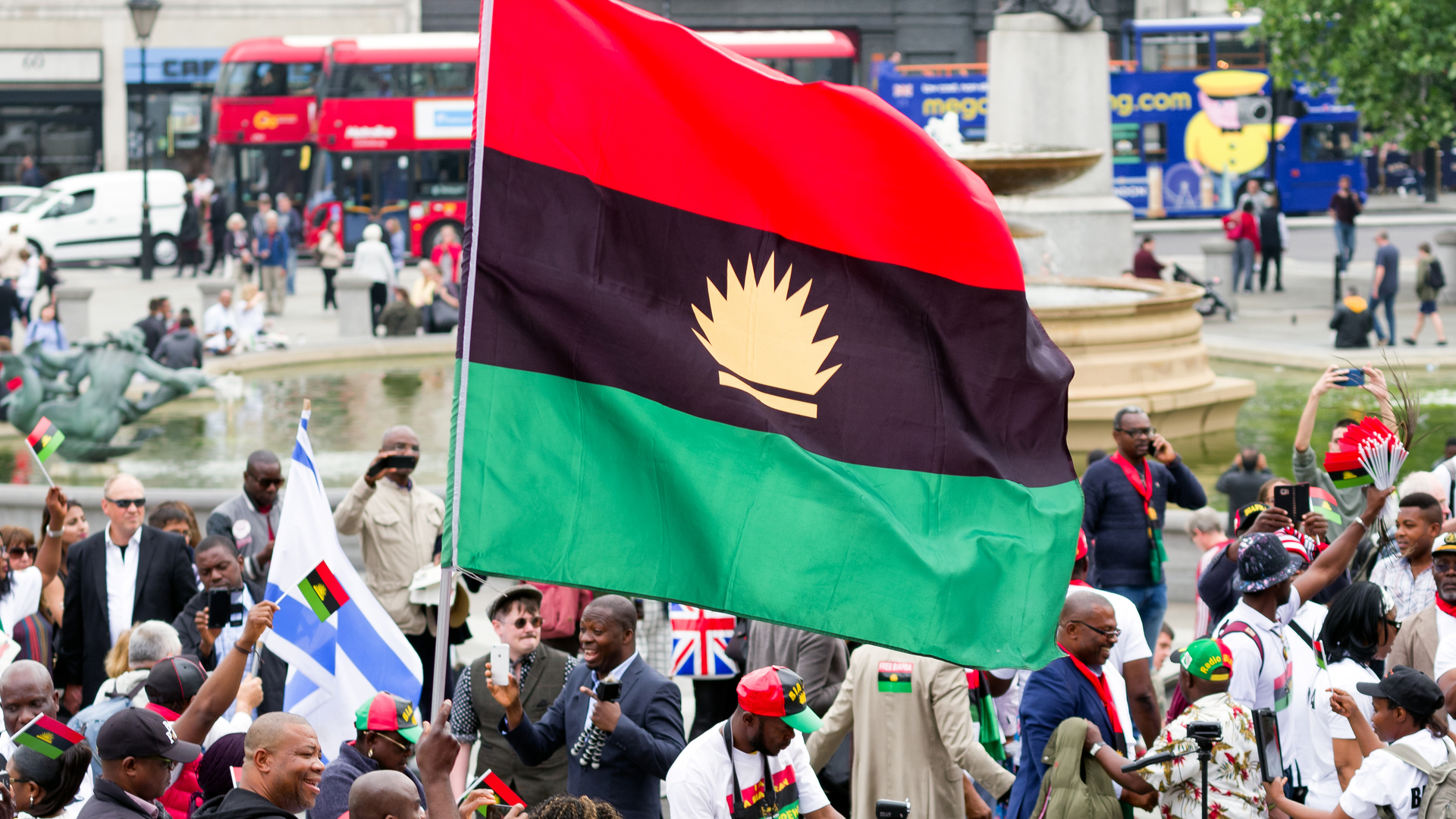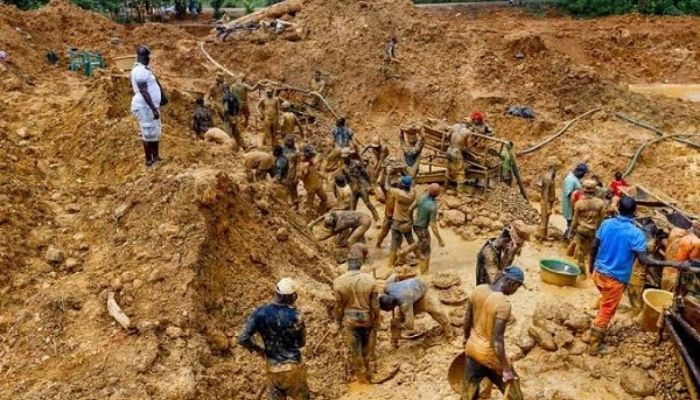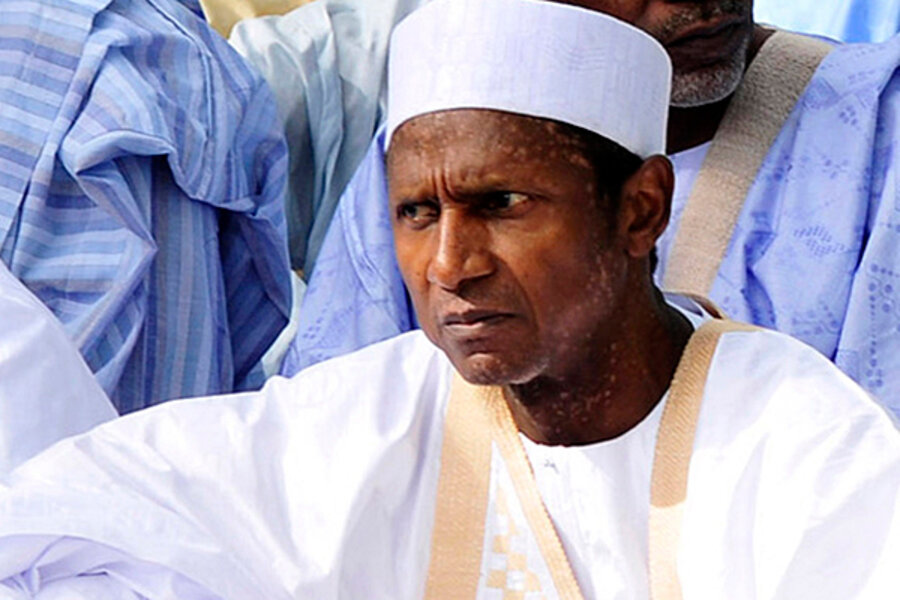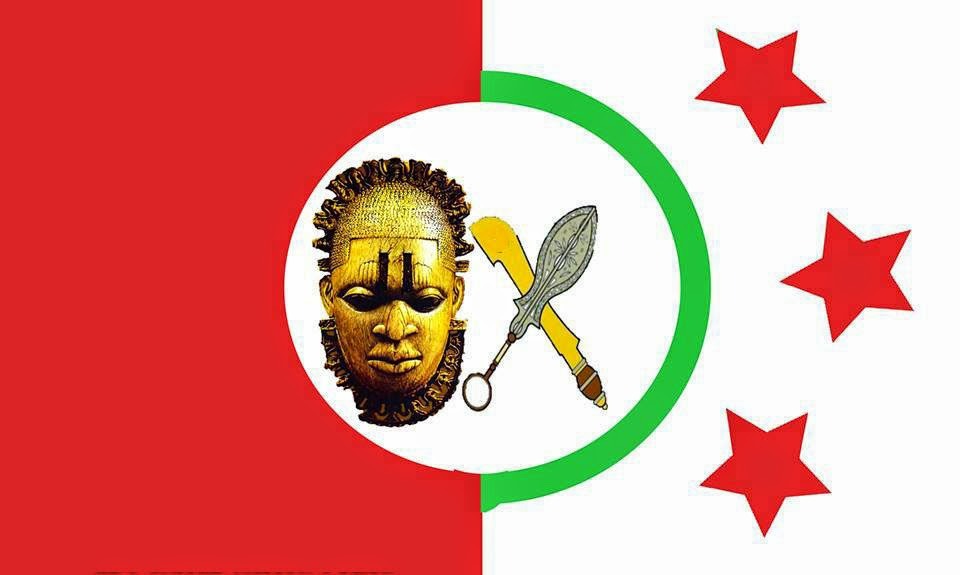Introduction
The “Witness to History” series is informed by the fact that knowledge of the past carried around deeply embedded in the minds of our fathers and mothers is priceless. Indeed, Hampate Ba, the Malian Writer once wrote that, "Every old person who dies in Africa is like a library set ablaze." We have a responsibility to seek out our elders, pin them down and ask them to tell us what they know and recall.
In this third part of the series - with my guest, Lt. Col. MO Nzefili (rtd) – the focus is on the Biafran invasion of and eviction from the Midwest. He also addresses questions related to his escape to Biafra, and a snapshot of subsequent Biafran operations within the Midwest.
At the end of this part of the series I shall address some issues brought up by readers (see below).
But first, let us return to the Colonel:
________________________________
QUESTION: WHAT CAN YOU RECALL ABOUT THE MID-WEST INCURSION OF 1967?
RESPONSE: I was completely out of the loop. As stated above, we were taken unawares, facilitated by some black legs amongst us. I was busy organizing and rehearsing the Civil Defence Operations in Benin and doing the write-up and training. I was, as it were, detached from conventional Army duties. I did not believe that the Biafrans would enter Mid-West for it had been agreed by the Federal, Eastern and Mid-West Governments that Mid-West should remain neutral.
In fact a company of Federal troops that entered Mid-West (led by Lt. Igbinosa) was ordered out of the Mid-West by Col. Conrad Nwawo, the 4th Area Commander, Benin. So one expected that Ojukwu who was aware of this should be gentleman enough to abide by the agreement. He did not and those of us who were not involved in the betrayal were taken completely unawares.
It was from my children who ran back from school to report about soldiers wearing pointed caps and shooting into the air that we knew Biafrans had landed in the Mid-West. I was shocked as it appeared there was no fighting all the way from Asaba.
I went underground. I had no personal weapon with me in the house. My civilian servant was my eyes and ears fortunately because he was an Auchi boy and understood the local language.
Some Biafran troops moved straight across Benin. The remainder assembled at Edokpolo Grammar School, where Col. Victor Banjo in the full uniform of a Nigerian Brigadier, addressed his troops. He never referred to himself as a Biafran but rather as a Nigerian on the way to defeat Gowon and proceed to the North to disarm the troops there and unify the Country. I was watching in mufti and heard him well from where I was concealed from him. He knew me well even from his Sandhurst days.
For as long as they were in Benin I kept my distance. 4th Area Command still operated as distinct from the Biafrans until suspicion tore the 4th Area Command apart and some Nigerians who came with them tactfully infiltrated the Command, thus getting some unwilling ones like Col. Igboba to be blackmailed into joining them.
Col. Henry Igboba visited me one evening in full battle order but strangely, he told me that Victor Banjo had arrested him. I reacted, “Then I am next”. When he was to leave around 3am I prevailed on him to sleep till the following morning before going. He did so, then left around 5am with a message that if I wanted transport I could ring him to send his Landrover. I rang his number around 11am but there was no reply. I became apprehensive. I was not to hear from him again. This was around the time he was being moved to be locked up at the Benin Prison by Biafran troops where he was later murdered by Federal troops even though he gave himself up while addressing them in Hausa.
Victor Banjo did all he could to get me, including the seizure of my official Mercedes Benz car, LNG 76 as a trap. A young Captain Nzeribe advised me to be wary of his Commander and to avoid the phone. He told me that my car, which was said to have been borrowed, had indeed been sent to Enugu for Col. Banjo’s use. I faithfully did abide by his advice and this saved me from suffering the same unfortunate fate as Col. Igboba.
The movement of Biafran troops from Benin and the surrounding areas was no withdrawal in the military sense of the word. It was retreat pure and simple. It was so confused that a lot of valuable Military equipment were left behind at their Benin Headquarters as they raced back to Agbor and beyond. There were quite a number moving aimlessly, all going eastwards.
I was not, strictly speaking, part of their operation, (except for Civil Defence in Benin). I was also avoiding Col. Banjo. Thus, I only got to know what happened when a civilian friend of mine, Mr. Bazuaye, came frantically to report to me that there were no more Biafran soldiers in Benin. Surprised, I went with him in his V.W. Beetle car and in mufti, straight to the 4th Area Command Headquarters. We walked into offices and there was nobody. We saw very many signals equipment neatly stacked in about in two offices and yet their problem was mainly communication. There were rifles in others. I picked a rifle and hid it in the car with the magazine on.
I did not know what to make of all this. I feared sabotage because the equipment were so carefully stacked and organized as if deliberately left for the advancing Nigerian troops. We went to a few places for me to confirm that indeed a full-scale retreat was in progress. No organized troop movement by vehicles or on foot was noticed. I returned home with Mr. Bazuaye. My family had earlier left for home but I came back to meet a long convoy of cars of Senior Civil Servants from our places at Aboh and Asaba Divisions waiting for me to take them out of Benin.
I went in and took a few things and leaving all else at the mercy of my Auchi servant, decided to go via Sapele Road. My rifle became handy although a rifle with one man in a multitude could do very little yet it heartened the refugees. Incidentally my Auchi servant was the one who single handedly brought my property from Lagos to Benin and he indeed successfully took my property from Benin to my village. My hat nearly got him into trouble on his way from Lagos but he got away safely.
I was a few cars behind the leading car of a Police Officer, Permanent Secretaries and senior Government Officials. We stopped to spend the night at Sapele, the first place we met the remnants of the retreating Biafran soldiers after passing those guarding the Sapele Bridge.
The following morning we proceeded to Chief O.I Dafe’s house at Obiaruku and from there as people broke away to their towns and villages we finished at Agbor from where I returned to Benin, through Benin-Agbor road.
The Nigerian troops met me in Benin, not face to face, as I tried to contact by phone as many of our people as possible who were confused and did not know what to do. My message was, “Get out of Benin by any means even if without any property”. They complied and I met them again during the war, with bundles of thanks for my help.
Artillery shells had by now started landing at Ikpoba Hill. On my way from Agbor to Benin I had met a few sappers from Biafran Engineers going to blow up the Ikpoba Bridge. However, they were hesitant and arguing among themselves. I hitchhiked to Benin, leaving them behind. When I got to Benin the shells were landing far from Benin but the advance appeared fast as the sound was getting nearer and nearer.
I got my car from the mechanic fixing the wiper but unfortunately they had deliberately siphoned the fuel from the tank. An Ogwashi-Uku man whom I had told to leave his motor cycle to join me was our saviour, as having gone barely 200 yards by car, the fuel finished. He then ran back for his bike and we headed for a friend of mine’s place near J. Allen Motors, one Mr. Nana.
As we were about crossing Mission Road, a Cpl. in Nigerian uniform probably on reconnaissance stopped us but before he could speak, I asked him what was happening over there around Ikpoba Hill. He said they were practicing. I told him that we civilians were afraid and did not know what to do. He allowed us to cross. I am sure he was suspicious of me but for the fact that I was on the back of a motor bike.
As we got near Nana’s house, a shell landed close by and the shrapnel cut some blades of grass nearby. “Mac, what was that”? Mr. Nana asked. “Shrapnel”, I answered. Please take us six miles outside Benin. Without further question, he put on a singlet but was nervous. I volunteered to drive and he obliged. Exactly six miles out of Benin, I stopped to bid him goodbye and to thank him for saving us. He refused and asked me to proceed to Sapele. He would not leave me there.
It was a brand new car, an Opel, less than a week old and his kindness overwhelmed me. We got to Sapele Junction and my passenger and I came down. I searched my pockets and found I had only two ten shilling notes. I wanted to share it with him because we did not check the fuel tank at any stage but by God’s work, we had left with full tank. He accepted nothing from me. We parted here. We met again after the war.
I commandeered a Landrover at Eku as I came down to see a Police Officer coming from Warri. By the look of his car he had an accident on his way escaping from Warri. He was with his whole family. The Land Rover did a very dangerous U-turn and sped off towards Sapele.
I took over driving from the Police Officer and together we landed at Chief Ogoegbunam Dafe’s house at Obiaruku. We slept there and I gave him messages for my parents and my wife and children, and continued to Agbor. I later gathered that my wife and my father at different occasions were prevented from passing through Agbor in search of me in Benin. My wife did a lot to stop my father until my friends stepped in. It was from Agbor that I floated to Enugu and to Biafra.
WHAT CAN YOU RECALL ABOUT THE MAY 9, 1969 KIDNAP OF ITALIAN OILMEN?
Background: On May 9, 1969, a group of mainly Italian oilmen working for the Italian Oil Company ENI were attacked at Kwale in the Midwest by a Biafran unit operating deep behind Nigerian lines. The unit allegedly belonged to the “Republic of Benin Division” under Colonel Joe “Hannibal” Achuzia. Ten Italians and one Jordanian were killed. The fourteen Italians, three Germans and one Lebanese who did not die during the raid were subsequently hoisted back into Biafra as hostages where they were tried and condemned to death by Biafran authorities. Under international pressure Biafran Leader Emeka Ojukwu released them on June 4, 1969 to diplomats from Gabon and Ivory Coast who passed them on to their home countries. The trial proved to be a strategic error on the part of the Biafran leadership, which thereafter lost the support of Italy and the Vatican.
On page 329 of his account of the war, former Biafran Army Commander, then Major General Alexander Madiebo said, “The news of the tremendous success of the operation which was meant to be a limited raid, came as a surprise to both Colonel Achuzia at his Headquarters at Oraifite near Onitsha, and to me at Army Headquarters, Isu.” The British journalist, John de St. Jorre, wrote that “The Biafran massacre of the eleven oilmen – as deliberate as any of the other atrocities – was designed presumably to discourage other foreign oilmen working in the Mid-West. None of these acts had the approval of the two leaderships and most of them happened without even the knowledge of the local field commanders. They were inexcusable but typical of the sort of horrifyingly brutal incident that occurs in every war.” It was surprising, therefore, to read in his book “The War of Nigerian Unity 1967 – 1970 (Evans 1970)”, Sir Alex Riven’s allegation that the Kwale operation was led by you. Is this true?
RESPONSE: Sir Alex Riven’s account is false.
I never commanded an Infantry Unit throughout my stay in Biafra even though I was an Acting Battalion Commander of 4Bn NA at Ibadan before the war and attended the Coy Commander’s course in UK (Hythe and Warminster). Instead I built up their Supply and Transport which was then under the Command of one of the officers I brought up in the Nigerian Army but who to my surprise was very reluctant to hand over to me. To him I was an Intruder. (See the “Reluctant Rebel” by Major Fola Oyewole).
The truth was that my father who escaped being captured in his house in the Mid-West, found me out at Umuahia, in the Eastern Region (then Biafra). When he could not stand all that was happening in Biafra and by which time we were living at Owerri, he requested to be taken nearer home.
My younger brother, Oliver, went with and stayed with him at AGWE, an island on the Niger, near UTCHI. It was here where he was with my brother that I went to visit him and to replenish his where-with-al. I did not go with the intention of fighting with anybody. In fact I went there with my wife.
However, on getting to the Mid-West, Col. Joe Achuzia in whose operational area AGWE is, appealed to me to accompany him to Aboh. He had a peculiar case before him. The Company Sergeant Major (CSM) of the Biafran company operating along the Aboh-Kwale axis had become so powerful that his Company Commander – a Biafran Captain - had to run to Col. Joe Achuzia at his Headquarters at Oraifite.
I left my wife with my father and accompanied Achuzia and his Company Commander to Aboh. On arrival at Aboh, we were almost ambushed by the C.S.M. and his men. He took aim at Joe Achuzia, but Joe was faster and gunned him down. In a very swift movement, the other mutineers were rounded up by the platoon we came with, tried in the open, and sentenced to death by firing squad.
At the point of execution, one of them shouted, “I am a Ghanaian, I am a Ghanaian”. But Aboh people pointed at another one who was looking bemused and dumbfounded and told Col Achuzia that the man was not one of the notorious men. He was accordingly released and the remaining six executed publicly by firing squad. They had enslaved the Community, and abducted wives and young under-aged single females. They looted the people’s property and lived like kings to the detriment of the assignment given them in the war front.
From Aboh we proceeded to Abalagada by Ase Creek and on the way to Kwale before which was an AGIP location at Beneku. The Capt. had never been to those areas and yet he was leading us blindly on. We came to a location with many caravans. The noise from the mosquitoes there was like jet planes taking off. Col. Achuzia soon found that we were dangerously close to Nigerian lines and when the Capt. could not answer a few questions asked of him, Joe let loose and gave him a few slaps. He then came to where I was to say, “Col. Nzefili, we must leave here at once.” Looking at Joe, no question was necessary. I later gathered that we were so close to Nigerian lines that they could hear us. However, hearing about two Colonels, they imagined it was a much larger force operating there and decided to be cautious. We withdrew fast.
It was in this area that I smelt the odor of decomposed and decomposing bodies. It was in this area that the Italians were murdered a few weeks before I went that way with Col. Achuzia and his men. Our aim of going to Abalagada and beyond towards Kwale location was to try and take possession of miniature pumps which we learnt were used by Agip to pump Crude Oil from Shallow Wells which abound in that area. Col. Achuzia was an Engineer and he knew what he was doing. We came back with none of these pumps because of the way we pulled out but we could easily have lost our lives. I returned to my wife and back to base.
The above should disprove Sir Alex Riven’s story. It is false, unkind and malicious.
I would like to have a copy of the book by Sir Alex Riven, which you referred to in your questionnaire. I have not heard about the book before now. It is serious. I was not contacted for verification and consent. What is more, I hate to be misrepresented to the Italians or to anybody at all. I consider the action of those that killed those men as murderous and so would not like to be associated in any way particularly when I was not there.
Like I said in the main body of my write-up, we from the Mid-West were not really welcome in Biafra and most of what happened there bring back sad memories but still, being there saved the lives of some of us and we thank God.
NOTE: On page 179 of his book, “The Nigerian Revolution and the Biafran War”, Madiebo provides a brief summary of the treatment (including beatings) meted out to some officers caught up in the “saboteur” mentality that consumed the Biafran Army. According to Madiebo, Nzefili was hospitalized at Awgu Hospital after one such experience.
In a forthcoming part, the Colonel will address remaining questions, including those that have to do with the Railway Corporation. But first let me do some housekeeping in the following appendices:
____________________________________________________
APPENDIX A
The Abeokuta All Arms Battle Group Course of 1965
One reader had sent in an important question for me to provide a cross-reference for the Colonel’s contention that he and most officers were indeed taken unawares by the January 15 coup. The reader was particularly interested in the “All Arms Battle Group Course” that took place at Abeokuta from September to December 1965 because one of the “Five Majors”, Adewale Ademoyega, was an instructor during that course. The course was later the focus of suspicion – by some officers of northern origin - as an opportunity for recruitment of some of the officers that took part in the January coup. This became the justification of an unfortunate phenomenon of guilt by association. To recap, according to my guest, Lt. Col. MO Nzefili (rtd),
“We had just finished the Battle Group Course at Abeokuta in December 1965 where I was 2i/c to Lt. Col. Francis Fajuyi and also the Chief Instructor. The other instructors were Majors S. A. Adegoke, Adewale Ademoyega and Iliya Bissala. There were some Captains and Lieutenants whose names I cannot remember now. So I was settling down in addition to rehearsing the parade for the Presentation of Colours to 4th Battalion, Nigerian Army that year. In fact I was attending the rehearsals from Abeokuta having had the advantage of experiencing the preparation for participation in such a parade at the Royal Military Academy, Sandhurst. I was then the second-in-command (2i/c) to Lt. Col. Abogo Largema, the then Commanding Officer of 4Bn NA, Ibadan, Western Region of Nigeria. “
Indeed, ex-Major Adewale Ademoyega himself, on page 59 of his book “Why we Struck”, acknowledges that then Major Nzefili was not a coup-plotting type of officer. In other words he was a loyal and professional officer devoted to his job. This is what Ademoyega wrote:
“Although there were three other Majors running the course with me, namely, Nzefili, Adegoke and Bisalla, I was able to draw Agbazue (ie Captain RI Agbazue) and his men (a demonstration company from 2Bn Ikeja) closer to me so that if the coup was to have taken place earlier than it did, that infantry company would be available for our use.
None of my colleagues was interested in the idea of a revolution. Major Nzefili was always devoted to other facets of military life. Major Adegoke too was more involved in the other sides of life, and would have nothing to do with our plan. Major Bisalla was serious, but was committed to the Balewa Government and would consider nothing to the contrary. However, Lieutenant Colonel Fajuyi who commanded the Course had sympathy for our course and was willing to contribute ideas towards the execution of our plan. It shall stand eternally to his credit that although the coup took place while he was away on leave, he rose for the revolution and stood firmly by its principles even until he breathed his last.”
Nevertheless, it is true that some younger officers were identified as “coup material” and recruited during the congregation of officers and units for the Abeokuta course. Among the students in that course, however, only Captain Ben Gbulie returned to Kaduna to join Nzeogwu in the plot. Among units being brought together to create the new “All-Arms” Abeokuta Garrison, Major John Obienu, tapped to take over the new Recce squadron at Abeokuta from Major Christian Anuforo (also a January conspirator), was recruited but reportedly switched loyalty and was among those that allegedly leaked the plot to General Ironsi. Captain Emmanuel Nwobosi – tapped to command a new Artillery Battery – took part in the coup and led operations at Ibadan.
According to Ademoyega, all efforts to penetrate Lt. Col. Largema’s Ibadan based 4 Bn NA were unsuccessful. That is why Nwobosi was tasked to drive all the way to Ibadan from Abeokuta to carry out the operation there – taking the 4Bn by surprise while their commander was in Lagos.
For purposes of completeness, this is the full list of those who took part in the “All Arms Battle Group Course” (with ranks as at that time):
Name Status INSTRUCTORS
Lt. Col. FA Fajuyi*
Course Commander
Major MO Nzefili
Chief Instructor
Major SA Adegoke
Senior Instructor
Major Adewale Ademoyega*
Senior Instructor
Major I Bisalla
Senior Instructor
Captain ADS Wya
Instructor
2/Lt Hammed
Instructor
STUDENTS
Captain Emmanuel Abisoye
Student
Captain Frank Aisida
Student
Captain Sule Apollo
Student
Captain David Bamigboye
Student
Captain Brown
Student
Captain JU Egere
Student
Captain Pius Eromobor
Student
Captain Ben Gbulie*
Student
Captain T.O. Iweanya
Student
Captain Gibson Jalo
Student
Captain B. Nnamani
Student
Captain Frank Obioha
Student
Captain Onifade
Student
*Officers highlighted knew of and/or took part in either the planning or execution of the January 15 coup
_______________________________________________
APPENDIX B: Disposition of Officers on the night of January 15, 1966
The second housekeeping question has to do with the command set-up of the Armed Forces and Police at that time. A reader wanted to place the 4Bn NA in context by knowing how many battalions there were at the time and the names of the commanders and deputy commanders.
ARMY HEADQUARTERS
GOC, NA
Maj Gen JTU Aguiyi-Ironsi
Chief of Staff, Nigerian Defence Forces
Brigadier BA Ogundipe
Chief of Staff, Nigerian Army (designate
Colonel Kur Mohammed*
GSO(1) ‘G’ Branch (Acting)
Lt. Col. Patrick Anwuna
Adjutant-General ‘A’ Branch
Lt. Col. James Yakubu Pam*
QMG ‘Q’ Branch
Lt. Col. Arthur Unegbe*
CO, NMTC, Kaduna
Col. Ralph Shodeinde* (also the 2ic, NDA)
Director, NAEME (Electrical and Mechanical Engineers), Lagos
Lt. Col. Victor Banjo
Director, Ordnance, Lagos
Lt. Col. Phillip Effiong
Director, Supply and Transport, Lagos
Lt. Col. Trimnell
CO, Depot NA, Zaria
Lt. Col. Wellington Bassey
Major Festus Akagha (2ic)
Abeokuta Garrison and All Arms Battle Group, Abeokuta
Commanding Officer
Lt. Col. Francis Fajuyi (on leave)
Lagos Garrison, Abalti Barracks
Commanding Officer
Lt. Col. Imo
1st Brigade, Kaduna
Brigade Commander
Brigadier Sam Ademulegun*
Brigade Major
Major A. Keshi
CO, 3rd Battalion, Kaduna
Lt. Col. George Kurubo
Major Israel Okoro (2ic)
CO, 5th battalion, Kano
Lt. Col. CO Ojukwu
OC, 1st Recce Squadron, Kaduna
Major Hassan Katsina
2nd Brigade, Lagos
Brigade Commander
Brigadier Z Maimalari*
Brigade Major
Major Emmanuel Ifeajuna
OC, Federal Guard, Lagos
Major Donatus Okafor
CO, 1st battalion, Enugu
Lt. Col. David Ejoor (incoming)
Major Gabriel Okonweze (2ic)
2nd Battalion, Ikeja
Lt. Col. Hilary Njoku (outgoing)
Lt. Col. Yakubu Gowon (incoming)
Major Henry Igboba (2ic)
4th Battalion, Ibadan
Lt. Col. Abogo Largema*
Major MO Nzefili (2ic)
OC, 2nd Recce Squadron, Abeokuta
Major John Obienu
6th Battalion, Benin (in formation)
Lt. Col. Conrad Nwawo (designated)
NAVAL HEADQUARTERS, LAGOS
Commander
Commodore JEA Wey
AIR FORCE HEADQUARTERS, KADUNA
Commandant
Colonel W. Timming (German Air Force)
POLICE HEADQUARTERS, LAGOS
Inspector General
Louis Edet (on leave)
Deputy Inspector General
Alhaji Kam Salem (acting IG)
Commissioners of Police
Lagos
Hamman Maiduguri
Enugu (East)
Patrick Okeke
Benin (Midwest)
Timothy Omobare
Kaduna (North)
MD Yusuf (acting)
Ibadan (West)
Odofin Bello
*Officers highlighted were assassinated on January 15, 1966.
Continued.........












